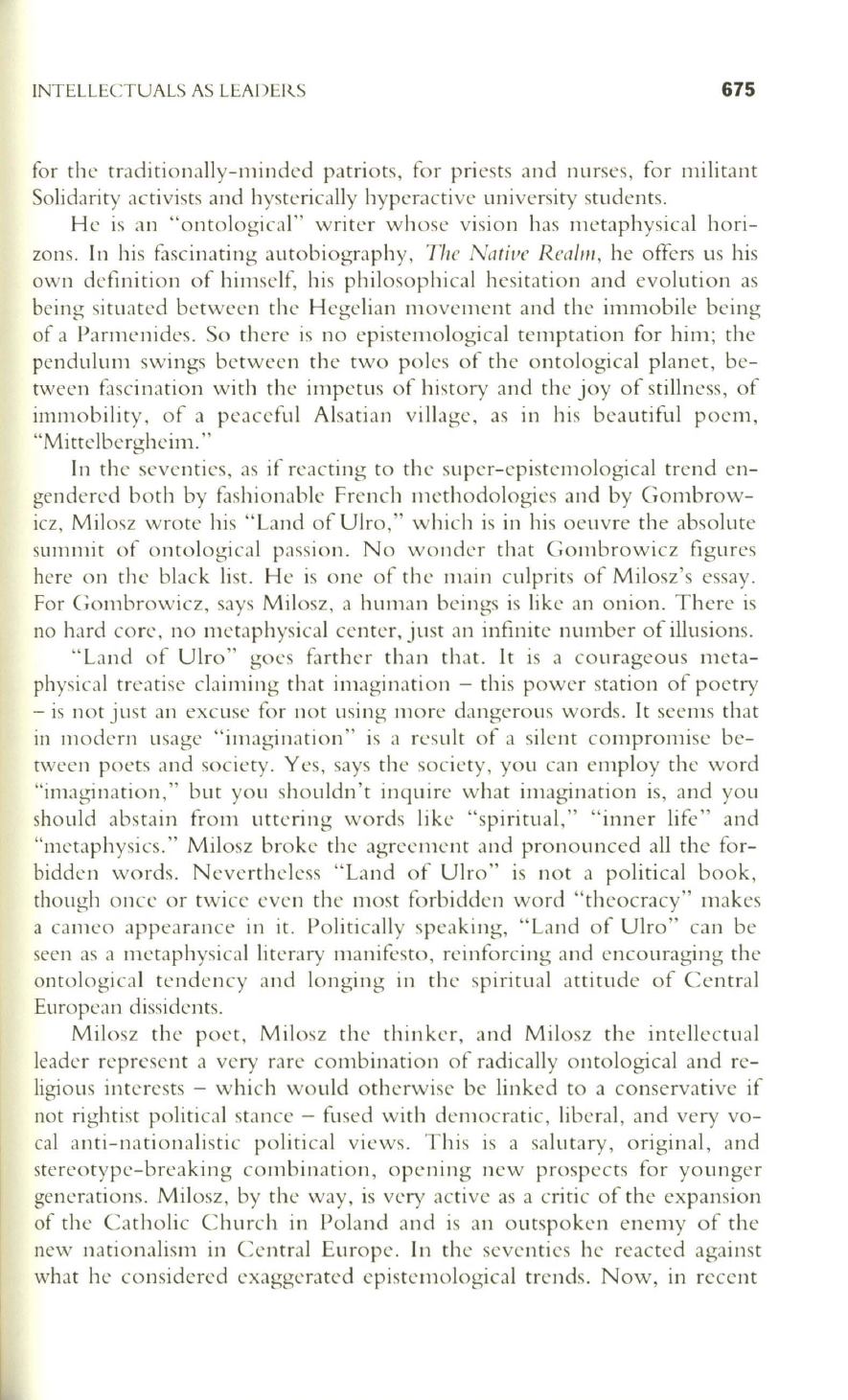
INTELLECTUALS AS LEADERS
675
fo r the traditi o nally-minded patri o ts, fo r pri ests and nurses, fo r militant
Solidari ty acti vists and hysteri cally hyperacti ve uni versity students.
H e is an "onto logical" w rit er wh ose vision has metaphys ical ho ri–
zons. In hi s fasc ina ting autobi ography,
The Na tive R ea/III ,
he offers us hi s
own definiti o n of himsel f, hi s philosophi ca l hes itati o n and evoluti o n as
being situ ated between the H egelian movement and the immobile being
of a Pannenides. So th ere is no epistelll ological temptati on fo r him; th e
pendulum swings betwee n th e two po les of th e o nto logical planet , be–
tween f3scinati o n with th e impetus o f hi story and the j oy of stilln ess, of
immob ility, o f a p e3ce ful Al s3 ti an vill age, as in hi s bea utiful poem ,
"Mittclbergheim."
In the seventi es, as if reac ting to th e super-epistemological trend en–
gendered bo th by fas hi o nable Fren ch methodologies and by Gombrow–
icz, Mil osz w rote hi s " L3nd of Ulro," whi ch is in hi s oeuvre th e absolute
sllmmit o f o nt ologica l passion. N o wo nder tlut Gombrowi cz fi gure s
here on the black list . He is o ne o f th e 1l13in culprits of Mil osz's essay.
For Gombrowicz, says Mil osz, a human beings is like an oni on . Th ere is
no hard core, no metaphysical center, just an infinite number of illu sions.
" Land of Ulro" goes fa rth er th an that. It is a courageous meta–
physica l trea ti se claimin g that imagin3ti o n - this power statio n of poetry
- is no t just an excuse for no t using mo re dangerous wo rds. It seems that
in modern usage " imagin ati o n" is a res ult of a silent compromi se be–
twee n poets and society. Yes, says the society, you can employ the wo rd
"imagin ati o n ," but you sho uldn ' t inquire w hat imaginati o n is, and you
should abstain from utterin g wo rds like "spiritu al," " inn er life" and
"metaphysics." Mil osz bro ke the 3greement and prono un ced all the fo r–
bidde n wo rd s. N eve rth eless "Land o f Ulro " is no t a po liti cal book ,
though o nce o r tw ice even the most fo rbidden wo rd " theoc racy" makes
a cameo appea rance in it . Po liti ca lly spea king, " Land of Ulro " ca n be
seen as a metaphysic3 l literary manifesto, rei nfo rcing and encouraging the
ontological tende ncy and lo ngin g in th e spiritu al attitude o f Ce ntral
Europe3n dissidents.
Mil osz th e poe t, Mil osz the think e r, and Mil osz th e intell ec tu al
leader represent a ve ry rare combinati o n o f radi call y o ntological and re–
ligio us interests - w hi ch would o therwi se be linked to a conse rva ti ve if
not ri ghti st politi cal stance - fu sed w ith democrati c, liberal, and very vo–
cal anti-n 3ti o nalisti c po liti cal vi ews. T hi s is a sa lutary, o ri ginal, and
stereo type-brea king combinati o n , openin g new prospec ts for youn ger
ge nerati ons. Milosz, by the way, is ve ry acti ve as a criti c o f th e expansion
of th e Ca tho li c C hurch in Poland and is an outspo ke n enemy of the
new na ti o nalism in C entral Europe. In the seventi es he reacted aga inst
what he considered exagge rated epistemological trends. N ow, in recent


